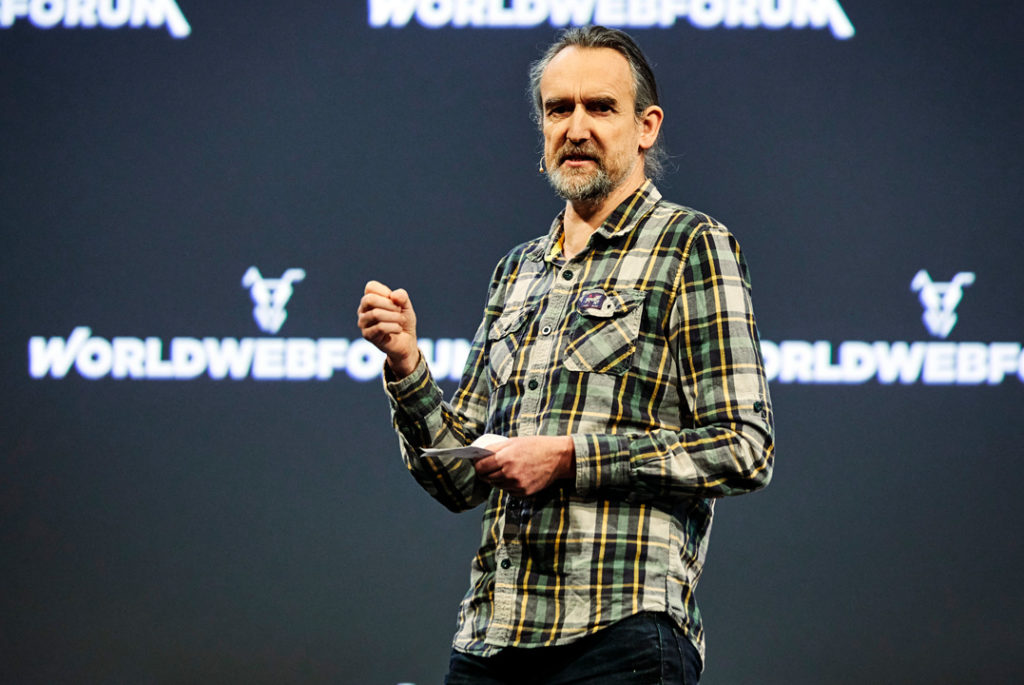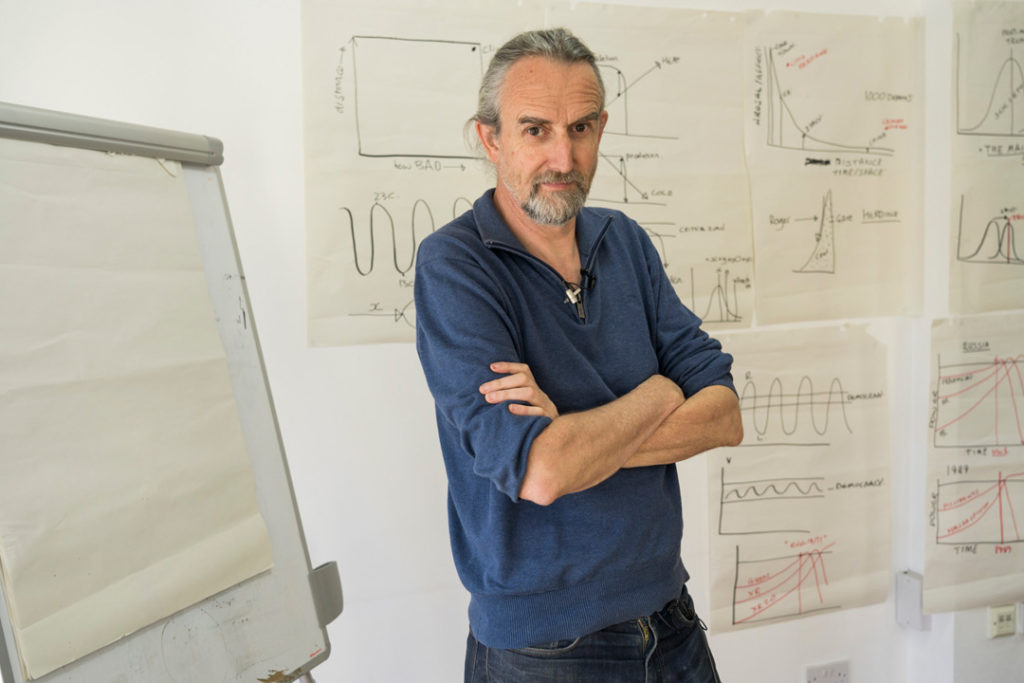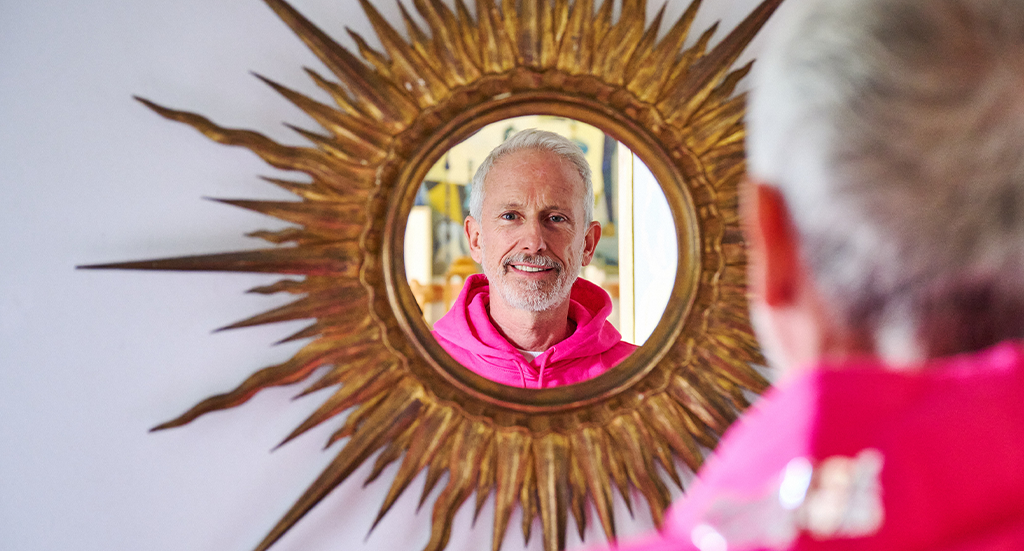The Roger Hallam Interview
How can we save our future?
How can we save our future? – An interview with Roger Hallam

Roger Hallam, born in May 1966, is an environmental activist. Hallam was previously an organic farmer from Wales who became known to a wider public from 2018 on as co-founder of Extinction Rebellion, especially in the UK.
In 2019 he published the book: ‚Common Sense for the 21st Century: Only Nonviolent Rebellion Can Now Stop Climate Breakdown and Social Collapse.‘
Last year he co-founded The Burning Pink Party. Burning Pink is a British political party with the stated goal of a political revolution by replacing the British government with citizens’ assemblies in order to tackle the climate crisis.
Roger Hallam x TEC
»We’ve come from a culture that beliefs that nature is irrelevant – but now nature is about to destroy civilization.«
You were an organic farmer in South Wales before you decided to become a political activist. Do you still have your farm?
Yes, it’s been used by other people now because I am full time in London – doing what I am do.
So, you do live in London and not in South Wales anymore?
Yes, I go back once a fortnight to see my kids plus my official home is still in Wales. I have been based in London now for about five years as I was doing research at Kings College on civil disobedience and mobilisation.
Was there an initial moment of insight that triggered your decision to leave Wales and start working as a political activist?
When I was a teenager, I always assumed I would become an academic because I am quite academically gifted. I went to the London School of Economics, but I left after a year because I preferred to be young and idealistic and spent most of my twenties doing radical activities. When it became clear that nothing dramatic was going to happen in the 1990s and early 2000s, I moved to Wales to have a family and grow organic vegetables. During that time from about 2005 onwards then it started to get the extreme weather events and then 2008 happened and basically that destroyed quite a large business for the farm and it’s 25 people team.
After that I decided to return to my first love which is intellectual and academic activity – that was my original impetus. But it was always in the back of my mind, as I think it’s in the back of most people’s minds, that the climate crisis is approaching and it’s just a matter of time until we are forced to engage with that.

You studied from 2017 to 2019 for a PhD at King’s College London, researching how to achieve social change through civil disobedience and radical movements. Which was or still is the most inspiring historical role model in that context for you personally and why?
You know the history of civil disobedience is broadly sensed around two figures: Gandhi and Martin Luther King. But there a numerous other people on the global who self-employed the social technologies of non-violence civil resistance. I was rediscovering and updating the mechanics of classical civil disobedience, the tactics of disruption to the point of arresting imprisonment and hunger strikes, as it was manifested before 1989 and before the neo-liberal period.
By the way. What about the Committee of 100 that started in the late 50s in the UK? Was that an interesting blueprint or kind of role model for you as well?
The last significant civil disobedience movement in the UK was the peace movement in the 1980s when thousands of people were arrested, and hundreds of people went into prison. I was involved in that as a teenager, so I was arrested and went to prison three times before I was 21.
I was very much embedded in that culture as a teenager. It’s been my life’s work really to work out how to use these mechanisms to bring about radical political chance. The Committee of 100 was just another not very well-developed iteration as I understand it.
Erica Chenoweth, a political scientist at Harvard University, stated once that it takes about 3.5% of the population actively participating in the protests to achieve serious political change. Are you familiar with that thesis and do you agree with that?
Yes, I am familiar with it. I think her studies more or less conclusive in establishing that violence is ineffectual creating progressive change and secondly that it takes a small proportion of population to bring about structural change. Though I don’t think the key number is 3.5%. I think that is largely misunderstood because it assumes sort of linear progression whereby you start off with a hundred thousand and then you move to half a million and then you move up to two million. The process of political change is radically non-linear. It’s in the sense that usually thousand or ten thousand people will go to the street and that will trigger repression from the state and the repression from the state creates a backfiring effect which brings out the 3.5%. As I like to say: the 3.5% will come out for the last fortnight.
The real practical task is the creation of mass mobilisation for the ten or twenty thousand people who would provoke the state into overreacting. This is a process that not infrequently triggers a regime change or a structural change in a society. This exists in a complex system in a sense that there is nothing mechanical about it. It’s a probability analysis and it’s not an absolute prediction.
»The biggest problem is a complete emotional inability to recognise the full extent of the horror.«
You said in your book “Common sense for the 21st Century”: “Only when the message is put into a culturally neutral language can a mass movement be built.” What do you mean by that?
Most mass mobilization is a particular social phenomenon which is quite unusual. Most of the time politic is dominated by various cultural elites and cultural groups which have specific exclusive identities and compete for power amongst themselves. But most of the population, for better or worse, don’t participate in the political process other than voting every five years.
One of the paradoxes of the political identity is that these traditional political elites both from the left and the right consciously or unconsciously lead to the alienation of most people. They act as a barrier for them entering political spaces because of various ideologies, ways of speaking and other sorts of cultural characteristics. The process of mass mobilisation and the process of getting to the 3.5% is not through creating a coalition between the various political elites on the left, it’s through mobilising people directly.
It’s in the old revolutionary sense of going to the people which means engaging people outside the institutions and bringing them into social spaces. Spaces where they feel welcomed, loved, appreciated and empowered through participation and inspirational rhetoric and such like. It’s through that process that you achieve the democratic transformations that we need to see.
»I see Greta Thunberg as a transitory figure.«
You also stated in your book that “The actions can have a fun atmosphere– most people respond to what is cultural and celebratory rather than political.”
Most people are attracted to social activities because of the social ability of those activities. They’re not attracted to it due to some sort of secular or Calvinistic critical ideology. That is something that is the preserve of intellectual elites and the urban middle class.
Most people who wish to engage in popular political activity will engaging it because they feel recognized and supported. It is about the socialness of the activity rather than the particular political ideology of the activity which explains why many people will move from the left to the right or from the right to the left because the ideologies have largely lost their appeal. What people are looking for is something that is more humanizing and fun.
What is your opinion on Greta Thunberg?
Greta Thunberg has been one of the primarily actors who galvanized the new narrative around the climate crisis and that is reinforced by the media who obviously likes to create personalities that they can create stories around. She played a very central role obviously in creating this new movement.
I see her as a transitory figure in a sense that she raised the issue as it were but the solutions to the predicament that we are in won’t be sold through conventional political protest. Not meaning to make a criticism of her, I mean it is very difficult to be all things to all people. I think the next step will be a radicalization of youth moving away from NGO, middle-class dominated forms of social protest towards classical civil resistance.

What experiences and insights led you to found the Burning Pink Party instead of staying in the context of Extinction Rebellion?
The proposition behind Burning Pink is that the classical strategy of revolutionary change in a society is too forward. It has to involve civil resistance on the street, and it has to involve standing in elections as a revolutionary party in order to pressurise the system from the inside. This true strategy has been fulfilled to a certain extent by ER in so much as it engaged in civil resistance – but the idea of Burning Pink is to fullfil and promote the other side of the equation: to produce a political party that is uncompromising in its promotion of the reality of what is coming down the road and what is necessary to respond to that reality.
The biggest problem here is a complete emotional and psychological inability of the elites of the western societies and the middle-class to recognize the full extent of the horror. In other words: the nature of climate change is seen as something that existed in the 1990s and early 2000s as a social and environmental issue. As a problem to be sorted out through technological fixes and such like. That was arguably the situation before the early 2000s but since 2009 the climate crisis is metaphysically changed as it were into a locked-in existential crisis of civilization. That’s because of the exponential increase in the geo-physical feedbacks which are now been experienced in the arctic, in the amazon and the perma-frost [regions]. The problem now is that those elites are very much stuck in a humanist 19th and 20th Century mind set and are unable to comprehend the extent to which they fucked up.
So why is the biggest part of the society in a kind of collective coma?
Because we as established human beings are not very good at changing their basic world views. It’s something that is very difficult to do. We’ve come from a culture that beliefs that nature is irrelevant and can be raped, abused, ignored and pited at the most to a situation where nature is about to destroy civilization. That change is happened in twenty years because of the extremity of the power of CO2 to destroy the geo-physical system. That’s an objective and horrific situation.
There is plenty of examples in history where cultures have collapsed because they haven’t been able to make diametrical changes in their analysis of what is going on. The hope really rests with the younger generation and with people outside the political system. Those two main groups that will mobilize over the next decade. The political elites on both the left and the right are addicted to the sort of humanist dogmas of the Enlightenment. It’s the idea that nature doesn’t exist and therefore it is inconceivable to these people that nature will destroy society because they don’t even understand that nature is real.
The main aim of all your actions is a radical and rapid transformation of the UK or worldwide economy to a zero-carbon emission status within five years or as soon as possible, is it?
The right way to see it is not in a voluntaristic sort of framing. The rapid transformation of the global economy is now locked in. There are two options: the global economy will collapse within the next twenty years or it will transform. Either way massive disruption is locked in. One of the illusions of the western middle classes is that voluntaristic myth is that the option is to have a massive transformation of the economy or a default by implication maintain the status quo.
The status quo is a geo-physical impossibility at this state in history. The choice is to bring about this political and this economic change through pro-active agents of political forces or it will be forced upon societies by extreme weather events that will manifest itself through drought and sea-level rise and most especially through the mass migration due to people not being able to grow food in the sub-tropical regions.
»Burning Pink is part of a new structural and cultural phenomenon which recognizes the need for a complete political transformation.«
One of the main aims of Burning Pink is to replace government with citizens assemblies…
I think Burning Pink is the first manifestation of a new radical realism that is basically acknowledging the ecological catastrophe that is now locked in. And this realism recognizes that there are only two major outcomes over the next twenty years: the imposition of various forms of fascism or the reinvention of democracy through citizens assemblies. The old regime will not survive the next two decades. Burning Pink is trying to create an ecologically based anti-fascist strategy for western societies by implementing the mechanisms of citizens assemblies. They will replace discredited political elites on both left and right by the mechanism of popular sovereignty.
What that means is people are select randomly from the population to make the core sovereign structural decisions over society. Which means that the political class is basically subservient to the will of the people expressed democratically through those assemblies. This has been prototyped in various countries and contexts and has been shown to be a vigorous and practical solution to making decisions which need to overcome inbuilt bipolarities in society. We need to move in that direction as rapidly as possible if we are going to minimize the fascistic sort of outcomes in the context of the ecological collapse.
Do you really hope or think that there is enough time left to establish structures like that in our western societies within the next years?
Well, I think there is a high level of urgency whether we achieve that or not. The practical task is whether people move towards a revolutionary perspective and draw from participation in the reformist political and social spaces. Whether they prepare for civil resistance and standing in elections on a revolutionary program of removing the political class.
Now at the moment of course that all seems ridiculous in the same sense as revolutionary parties in the past seemed ridiculous before the revolutions. But the proposition is that this logic will become more and more self-evident particularly as the Paris Agreement begins to collapse over the next five years. And it’s certain in the view of many people within the government and in the governments’ classes that the system will not survive the next decade because of the physical realities of what is going to face.
Let’s focus on the current actions and plans of the Burning Pink Party. In January, Burning Pink launched a campaign to confront 21 local councils with very specific demands in order to incorporate climate-neutral action into regional policy in a consistent and rapid manner. Besides drastic negative feedback, was there also positive feedback from some councils?
We are constantly talking to a lot of councilors who are aware of the extremity of the challenges they face. There is enormous discontent in local government with having a very centralized system in the UK where local councilors basically have to enact policies or non-policies with regards to the climate emergency over the last ten to twenty years which any intelligent person would know as futile and antagonistic.
People who are on the outside of or the edges of the political class like rural or small-town councilors are beginning to understand that they are the fall guys in the approaching political struggles of the next ten years. They consciously or subconsciously are trying to find a way out of being in that position. And what we are encouraging them to do is to stand in civil resistance against their councils and against central government. That is the only rational and moral sort of pathway at the present time.
Do you focus on establishing Burning Pink on the UK first of all? Or are there plans to establish BP in Europe as well?
I think it’s important to see Burning Pink as one of a number of iterations of political actors which will come about over the next five to ten years. I am not making any great predictions for whether Burning Pink will succeed in its present form. It may do, it may not.
The point is that Burning Pink is part of a new structural and cultural phenomenon which recognizes the need for a complete political transformation. In so much as it does that then it’s connected to other revolutionary movements around the world that are moving away from the old left and right. As such Burning Pink will either initiate or cooperate with other iterations in Germany, Scandinavia, the US, Canada and all the western democracies over the coming months and years.
»Green parties will be getting into power fairly quickly and will prove themselves to be unable to deal with the extremity of the situation we face.«
Are there currently groups or parties you consider as good, relevant and interesting as future partners.
I think most of the work on citizens assemblies has been done by civil society groups and outside the political process of the present time. I think increasingly political parties will emerge that have that as the main part of their platform.
I think we will see this emerge whether or not Burning Pink is successful over the next year. We will start to see the emergence of political parties which have this perspective and set-up as an alternative to the reformist green parties. Green parties will be getting into power fairly quickly and will prove themselves to be unable to deal with the extremity of the situation we face.
What about the media, what are your experiences here?
The conventional media is controlled by the elites many on the right and some on the left. Both of those elites have in common a complete inability to understand the gravity of the situation, particularly in terms of the social effects. Even on the left, papers like The Guardian talk extensively about the “environmental” consequences of the climate change.
The problem is: they only briefly talk about the social consequences. An example of this is the framing of the climate crisis as an environmental issue. This of course is part of the old thinking that there is a problem out there that is separate from us. What we face is a crisis which transcends a social in the ecological. Because both of those are completely intertwined as we see with the covid crisis.
As I do two to three interviews a week for the past two years, my experience with the mainstream media at least is that there is no emotional or political understanding of what is coming down the road. Of course, it’s not really in the interest of the media to do that because they don’t want to see big disruption to the political and economic system they benefit from.

What do you think is the best source of information on current insights and facts about climate change? Where should people get reliable information? What is your preferred source of information?
I think the issue with information is not of primarily importance anymore because everyone acknowledges the extend of the transformation that has to happen. It’s more whether they see it in abstract ecological terms or whether they see that in concrete political terms. Everyone from the Financial Times to the Bank of England to the UN to the Democratic Party in the US, they all now have the rhetoric of the climate emergency. The facts aren’t really in dispute apart from the right-wing fringe parties. What in dispute is the inability of the political system to change rapidly enough to make any effective response to that crisis. That’s the problem. And this brings us back to the issue of civil resistance and mass mobilization, the emotionality of struggle. What creates the change is not information at this stage in history. What creates the change is the pro-active design of civil resistance and that’s what I spend most of my time doing.
It’s particularly evident when you get out of the political elites because most people in society even though they don’t know the specifics, they are broadly aware that we are in this crisis. They are profoundly alienated from the political elites not least because of the crisis and they’re looking for alternatives. The alternatives which are established today are fascistic ways of putting your head in the sand or radical democratic alternatives. So that is the task at this point in history is to go to the people outside these elites and mobilize them to create their own political institutions through citizens assemblies and to engage in civil resistance.
Let’s take a brief look at the recent past again. Was there a specific experience that led to the decision to start with Burning Pink rather than staying with Extinction Rebellion?
Well although I am a co-founder of Extinction Rebellion, I see how it has progressed as establishing itself as a transitionary movement in the same as “Fridays for Future” is a transitionary movement. It’s got one foot in the delusions of reformism and it’s got one foot in the new world of revolutionary change and it can’t make up its mind which one it is in. Just because it’s very attractive to replicate the failed mechanisms of the past and to engage in reformist lobbying and conventional social movement activity. At the same time, the brutal facts of the climate crisis force it to entertain the reality that only revolutionary change and civil resistance will bring about the change which is necessary in the short period we have left for a meaningful democratic change. Burning Pink is the next iteration of this process which make the full transition to ecological realism of saying “this is the way it is, because this is the way it is”.
It will appeal to people outside the middle-class urban elites which have dominated the environmental movement in the western world, and it will appeal more directly to the young, to the old, to the regional towns and cities and to the lower middle class. In other words: to broader demographics of society who are aware of the crisis and are deluded by the reformism of conventional social movement elites.
How do you see the future in post-covid times?
As covid retreats which hopefully it will do because of the vaccines then there will be, I would predict, a big resurgence of mass civil disobedience and there will be a reckoning within ER and within the other new climate movements and whether they wish to revert to conventional political campaigning or move towards a civil resistance strategy. That, I suspect, will probably mean that they will split or radicalize over the next year or so and that is what we will see post-covid.
Thank you, Roger!






Join our Community